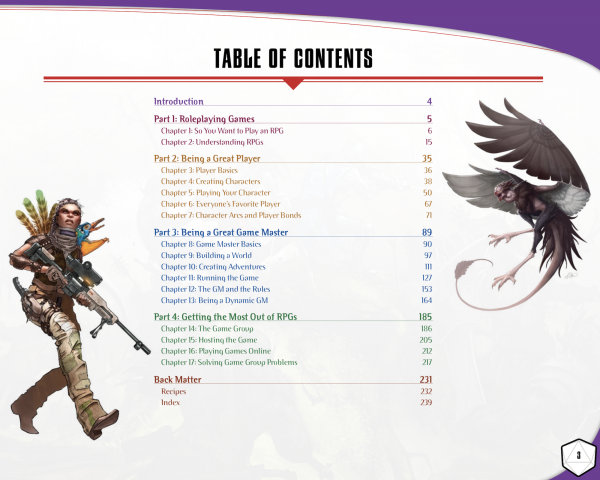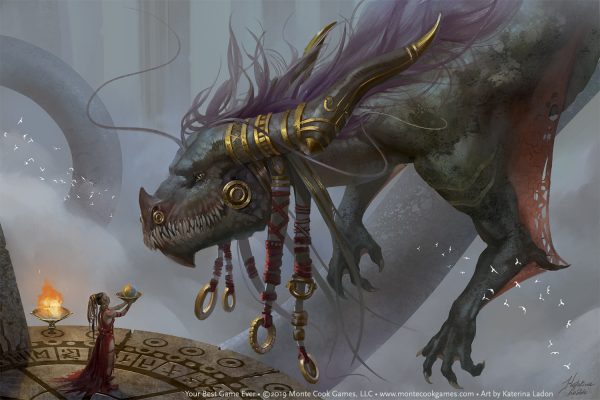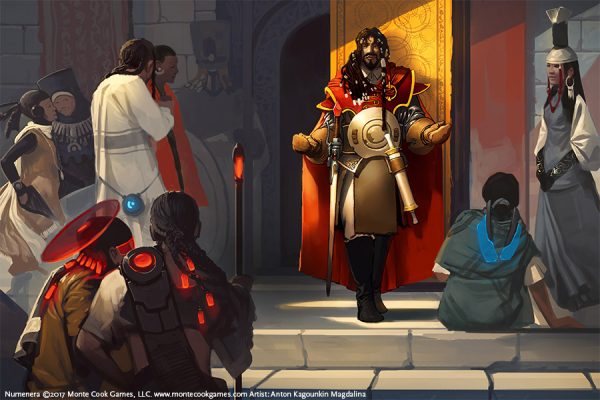Your Best Game Ever devotes five chapters exclusively to being a great player. Today we bring you an excerpt about how to introduce your freshly-made character at the table!

Introduce Yourself
You’ve made your character and come up with some great background details and story hooks. Now it’s time to introduce yourself to the other players. When you do this, think about what the other characters would know about yours, and think about what the other players need to know to enjoy the game.
For the characters, consider first and foremost how long they’ve known your character. If they’ve been together for some time, they probably know your character fairly well. Tell them the most relevant details that they would know from your time together. Start with your character’s name and appearance, of course, but also add typical ways of going about things and moving through the world. Is your character sneaky? Itching for a fight? Maybe they love magic or are really good at fixing things. Maybe they love exploring or hate orcs. If it’s something observable or something your character talks about often, let the others know. This is all much more important than a list of your skills or your exact stats. (That kind of metagame information can come later.)
Of course, if the other characters are meeting yours for the first time, a description of their physical appearance (including clothing worn or gear carried) and maybe the sound of their voice is all you share up front. The others will have to learn the rest in the course of the first session(s).
But for the players, if you have a character with some kind of special requirements or goals that are likely to impact the story, you might want to give them a heads up. You don’t need to reveal everything— sometimes it’s better and more fun for players to learn about the other characters in the group through action and play (see below for more on “show, don’t tell”).
In fact, it’s okay to have a secret or two. Your character’s backstory might revolve around the fact that their mother was an evil necromancer, but if that’s not something your character would likely bring up, don’t share it. Let it come out later in the campaign, perhaps at a dramatic moment—that’s the kind of thing where you can work with the GM to develop a prominent storyline, if that’s something you both want.

Show, Don’t Tell
New writers are advised all the time to “show, don’t tell.” Basically, it means don’t tell the reader that the mountains in the distance are beautiful—describe them and let the readers see for themselves.
This isn’t a bad approach to playing your character. It’s much more important to show the other people at the table that your character is crafty and sneaky than to tell them. There’s nothing wrong with telling them, but follow it up with actions in the course of play that back up your assertions. Actions are more memorable than words. They make a bigger impression. You can talk about your character at length, but at the end of the session, the other players will remember what your character actually did.
Develop a Voice
Lots of players use a different voice for their character—one that’s higher or lower in pitch, or maybe has an accent (dwarves are often Scottish, for whatever reason). That’s cool, but it’s not a talent that everyone has. So that’s not what I’m describing here. No, instead, I mean “voice” in the writerly sense, once again. You know how when you’re reading fiction and the author tells you what a character said, and then tells you who said it? “Get out of here, jerkface,” Carlo said. Well, a good writer doesn’t have to tell you that Carlo said that, because the writer will have made Carlo such a clearly defined character in your mind that there’s no question whether a line comes from him or someone else, regardless of attribution. You know Carlo always calls his friend Allen “jerkface,” for example.
In a perfect world, you’ll do the same with your character. There won’t be any need to tell the other players that you’re speaking as your character if your character has a well-defined voice.
Voice encapsulates background, education level, attitude, and emotions. Does your character use a lot of slang and contractions, or are they more formal? Do they get easily offended or angry? Are they gruff or long winded—or something else entirely? Do they always stick up for what they perceive as being right? Do they frequently bring most conversations around to their love of pastries? These are all part of the voice that I’m referring to.
